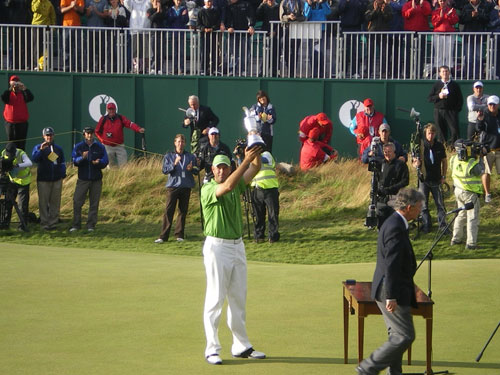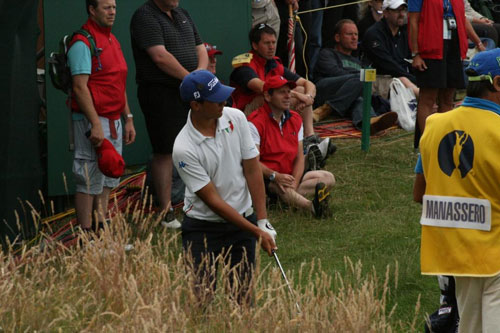But the lie was so bad that Watson could only hack it a few yards up the rough and still short of Cink's tee-shot; he eventually escaped from the long grass with his third but left himself a very long approach. Cink greened his second; Watson hit the green too but short of Cink's ball.
Again he hit a very long putt close, but so did Cink. Cink converted his birdie, but Watson missed his bogey and carded a seven. Four shots separated the players; one hole to play. Effectively, Cink was champion in all but name.
It would be kindest to draw a veil over the six shots that Watson played on the 18th – it was clear that his mind was no longer on the outcome of the playoff, but probably already lost in feelings of regret.
"It would have been one hell of a story, wouldn't it?" he said. "But it just wasn't to be. It tears at your gut, as it has always torn at my gut. It's not easy to take. I put myself in a position to win, and I didn't do it at the last hole. In retrospect I probably would have hit a 9-iron rather than an 8-iron. I was thinking 9, but I said I'll hit an 8, and though I caught it just the way I wanted to, sure enough it went too far. Then I chose to putt it from the short rough there. I just felt that I had a better chance to get it close. I looked at that upslope, thought I saw some grain in there, so I decided I wasn't going to leave it short, and I gunned it by and made a lousy putt. The playoff was just one bad shot after another. Stewart did what he had to do, and I didn't give him much competition."
It is a pity that this championship will be remembered as the one where Old Tom Watson blew up in the playoff. Cink's wonderful playoff approach shot on the 18th, a pitching wedge to inside of three feet, was worthy of winning any tournament. But that shot – Cink's 13th in the playoff – is likely to be forgotten among the 21 shots that Watson played over the four holes.
Not that Cink had time for such thoughts. Asked if he felt any disappointment or even regret that Watson had not been able to carry his form over the 72 holes of regulation play into the playoff and make a better contest of it, Cink replied with admirable frankness.
 |
|
Stewart Cink, 2009 Open Champion, holds aloft the trophy to the acclaim of the crowd. [China.org.cn]
|
"Have I put a red pen through what would have been one of the greatest stories in golfing history? I don't feel ashamed. I don't feel disappointed. I'm pleased as punch that I've won this tournament, and also proud of the way Tom Watson played because he showed… not only did he show how great a golfer he is, but he showed what a great game we all play – the longevity that can exist for guys to come out and compete. We all thought what an achievement when Jack Nicklaus came out and won The Masters at 46. This guy is 13 years on from that. 13 more years of age. That just says a lot about golf."
Cink earned his win because he was the only player in the top dozen at the start of play to come in with a sub-par round – a 69.
The course showed yet another of its many faces on this final day. The wind had shifted round a further ninety degrees to the south-west, creating a new set of puzzles for the players. Once again scores were high – the best of the day were a set of 67s from Jeff Overton of the USA, Anders Romero of Argentina, Denmark's Soren Hansen, Luke Donald of England, and most notably, the English youngster Chris Wood.
The 21-year old finished in a tie with Lee Westwood for third place at one-under. For a long time he was the clubhouse leader, and must have been harbouring thoughts of a play-off until Cink came in with his two-under. Chris Wood finished fifth in the 2008 as an amateur in his first Open last year at Royal Birkdale – his two finishes of fifth and third in his only two Opens give him a record which many top players will never achieve in their whole careers.
 |
|
Winner of the Silver Medal for Best Amateur, 16-year old Italian prodigy Matteo Manassero went on to finish in a tie for 13th place on two-under. [China.org.cn]
|
Another youngster who can feel a great sense of pride in his performance is the young Italian amateur Matteo Manserro. He kept his cool when others around him were losing theirs and finished in a very creditable tie for 13th place on two-over, scoring a 69 in his final round.
All in all it was a day of absurd drama, and the final denouement was a fitting ending. For the spectators who arrived early excitement was provided from the outset. It is ten years since Paul Lawrie came back from a ten-stroke deficit to win at Carnoustie. Here at Turnberry he was never in contention, but he warmed Scottish hearts with a two at the par-5 7th, holing a 4-iron from 213 yards for that rarest of birds, an albatross.
Shortly afterwards, American Kevin Sutherland holed out from a similar distance on the long par-4 5th for an eagle 2. Then Thomas Levet of France carded a hole-in-one with a 5-iron at the par-3 15th.
But the real excitement began once the main actors took to the stage. One of the two big English hopes, Ross Fisher, birdied his first two holes to move to five-under. Behind him Tom Watson bogeyed the first, and Mathew Goggin the second. Then Watson bogeyed the third, and the final pairing was at two-under along with Lee Westwood. Fisher found himself moving from a deficit of two to a lead of three in the first three holes – an incredible turnaround.